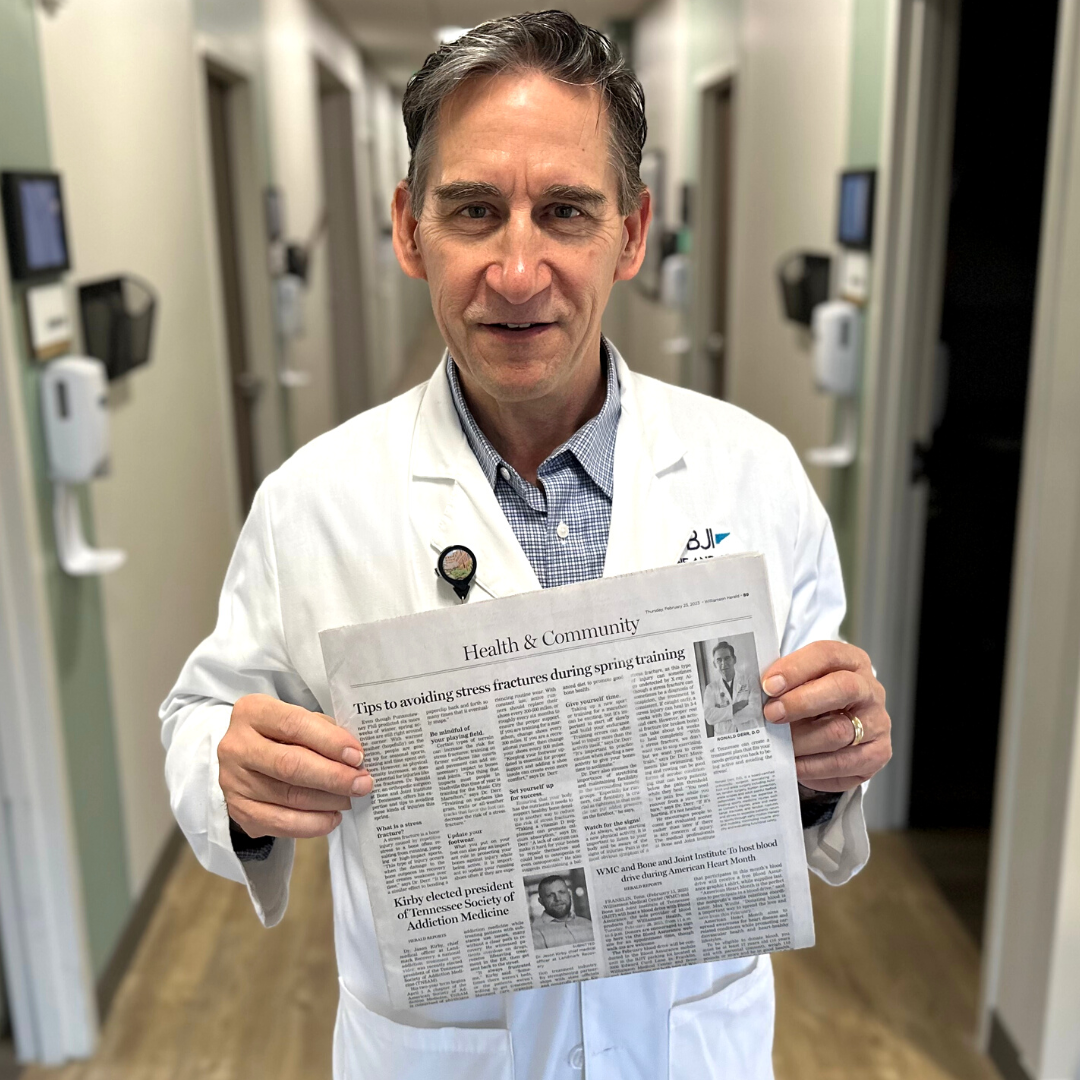
25 Feb Avoiding Stress Fractures with Dr. Ronald Derr
Originally published in the Williamson Herald –
Even though Punxsutawney Phil predicted six more weeks of winter, spring activities are still right around the corner. With warmer weather (hopefully) on the horizon, people are gearing up for seasonal sports, training and time spent outdoors. However, as physical intensity increases, so does the potential for injuries like stress fractures. Dr. Ronald Derr, an orthopedic surgeon at Bone and Joint Institute of Tennessee, offers his expertise and tips to avoiding these kinds of injuries this spring.
What is a stress fracture?
A stress fracture is a bone injury caused by repetitive stress to a bone often resulting from running, jumping or high-impact sports. “This type of injury occurs when the damage to the bone outpaces its recovery and creates weakness over time,” says Dr. Derr. “It has a similar effect to bending a paperclip back and forth so many times that it eventually snaps.”
Be mindful of your playing field
Certain types of terrain can increase the risk for stress fractures; training on firmer surfaces like courts and pavement can add unnecessary impact to bones and joints. “The thing that impacts most people in Nashville this time of year is training for the Music City Marathon,” says Dr. Derr. “Training on surfaces like grass, trails or all-weather tracks that favor the foot can decrease the risk of a stress fracture.”
Update your footwear
What you put on your feet can also play an important role in protecting your bones against injury while being active. It is important to update your running shoes often if they are experiencing routine wear. With constant use, active runners should replace their shoes every 300-500 miles, or roughly every six months to ensure the proper support. If you are training for a marathon, change shoes every 300 miles. If you are a recreational runner, then change your shoes every 500 miles. “Keeping your footwear updated is essential for proper support and adding a shoe insole can create even more comfort,” says Dr. Derr.
Set yourself up for success
Ensuring that your body has the nutrients it needs to support healthy bone density is another way to reduce the risk of stress fractures. “Taking a vitamin D supplement can promote calcium absorption,” says Dr. Derr. “A lack of calcium can make it hard for your bones to repair themselves and could lead to osteopenia or even osteoporosis.” He also suggests maintaining a balanced diet to promote good bone health.
Give yourself time
Taking up a new sport or training for a marathon can be exciting, but it’s important to start off slowly and build your endurance. “Training errors can often lead to injury more than the activity itself,” says Dr. Derr. “It’s important to practice caution when starting a new activity to give your bones time to acclimate.”
Dr. Derr also stresses the importance of stretching and maintaining flexibility in the surrounding muscle groups. “Especially for runners, calf flexibility is crucial as tightness in that muscle can put added pressure on the forefoot,” he says.
Watch for the signs!
As always, when starting a new physical activity, it is important to listen to your body and be aware of the signs of injuries. Pain is the most obvious symptom of a stress fracture, as this type of injury can sometimes go undetected by X-ray. Although a stress fracture can sometimes be a diagnosis of suspicion, the treatment is consistent. If caught early, a stress injury can heal in 3-4 weeks with the proper rest and care. However, an actual fracture (or broken bone) can take about 6-8 weeks to heal completely. “With a stress fracture, we don’t want you to stop exercising, but we want you to cross train,” says Dr. Derr. Movements like swimming, biking and rowing can be good forms of aerobic conditioning that can keep patients below the pain threshold while they heal. “You need to be pain free while you recover from a stress fracture,” says Dr. Derr. “If it’s hurting, it’s not healing.”
He encourages people to come get evaluated sooner rather than later if there is any concern of injury. The medical professionals at Bone and Joint Institute of Tennessee can create a treatment plan that fits your needs getting you back to being active and avoiding the stress! To setup your consultation today, click here or call the clinic at (615) 791-2630.
Ronald Derr, D.O., is a board-certified orthopedic surgeon specializing in foot and ankle surgery including Achilles tendon surgery, bunion correction, ankle scopes and adult painful flatfoot deformities. He also has expertise in treating sports medicine injuries such as Lisfranc’s injuries, ankle and metatarsal fractures and tendon ruptures, and strives to expedite patients’ return to sports through early motion therapy and mobility, minimizing muscle atrophy and evaluating functional safety.
